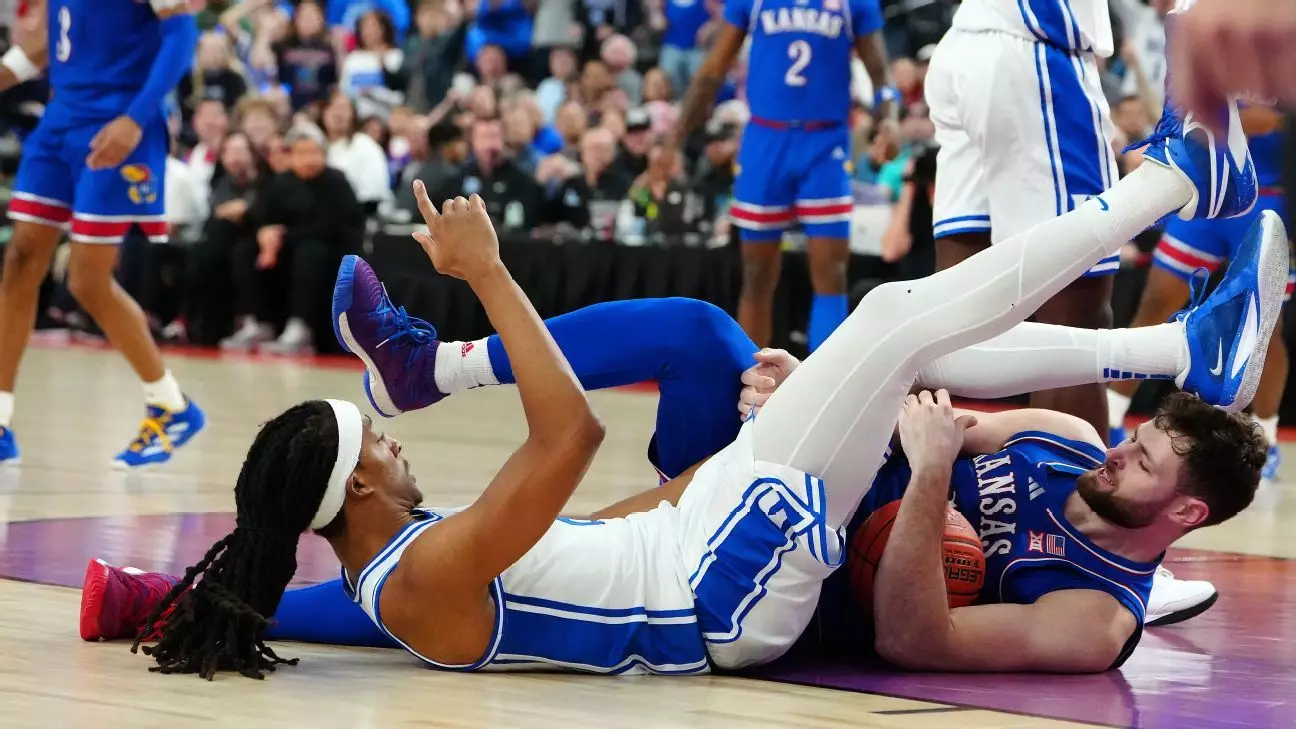In a thrilling college basketball match that saw the No. 1 Kansas Jayhawks narrowly defeat the No. 11 Duke Blue Devils 75-72, the crucial moment came with the ejection of star center Hunter Dickinson. The incident raised questions about officiating, player discipline, and team dynamics, showcasing how a single moment can alter the course of a game.
Context of the Game
Kansas entered the matchup with high expectations, bolstered by Dickinson’s impressive performance on the court. Averaging 17.8 points and 10.4 rebounds prior to the game, he was a pivotal figure for the Jayhawks. As the second half progressed, tensions mounted, particularly during a rebound battle against Duke’s Maliq Brown. After a missed shot, Dickinson’s attempt to secure the ball escalated into more than just a fight for possession. An errant kick to Brown’s face resulted in a significant turning point for both teams.
With just over ten minutes left on the clock, the altercation unfolded. The call for a flagrant foul was reviewed extensively, leading to Dickinson’s ejection. Kansas coach Bill Self initially described the ruling as overly severe but acknowledged the necessity of the call to maintain game integrity. This nuanced response reveals a coach’s internal conflict—while supporting player safety and responsibility, he simultaneously wanted to ensure his star player was not unduly punished.
Duke’s head coach, Jon Scheyer, while having only seen the incident through a screen, agreed with the referee’s verdict. Both coaches seemed to recognize that such actions could undermine the spirit of the game, yet they also appreciated the ambiguous nature of officiating and the potential for inconsistent interpretations of the rules.
Dickinson’s absence might have been perceived as a disadvantage for Kansas; however, it sparked unanticipated resilience among the players. With Kansas leading by a mere two points at the time of Dickinson’s ejection, the pressure was on. Enter freshman Flory Bidunga, who stepped up admirably in his place. Over 16 minutes, Bidunga contributed 6 points and secured 8 rebounds, particularly making his mark in the closing moments of the game.
The transition from Dickinson to Bidunga showcased the depth of the Jayhawks’ roster. Instead of faltering under the abrupt change, Kansas exhibited tenacity and resourcefulness. Players like KJ Adams Jr. echoed this sentiment, praising Bidunga’s performance and suggesting that the young player’s contributions bolstered the team’s morale.
Lessons Learned from the Incident
Coach Bill Self’s insights following the ejection were revealing. He articulated that Dickinson’s disciplinary action, while severe, could serve as a learning experience, reinforcing the consequences of emotional play and encouraging other players to take on increased responsibility. The ability to adapt under pressure can transform a team’s dynamics and foster a stronger sense of unity.
This incident is more than just a story of one player’s mistake; it serves as a profound reminder about the importance of sportsmanship, teamwork, and resilience. In the context of college athletics, where every game can significantly impact season standings and player development, such incidents can shape team identities long after the final buzzer.
As Kansas continues its season, the aftermath of Dickinson’s ejection will resonate. While individual prowess is essential, the capability of a team to rally, adapt, and support one another in challenging situations often defines successful programs. The victory against Duke, despite Dickinson’s departure, underscores the multifaceted nature of college basketball, wherein teamwork, adaptability, and mental fortitude can alter the game’s trajectory. The path forward may hold lessons for both players and coaches as they navigate the pressures and challenges of the season ahead.


Leave a Reply